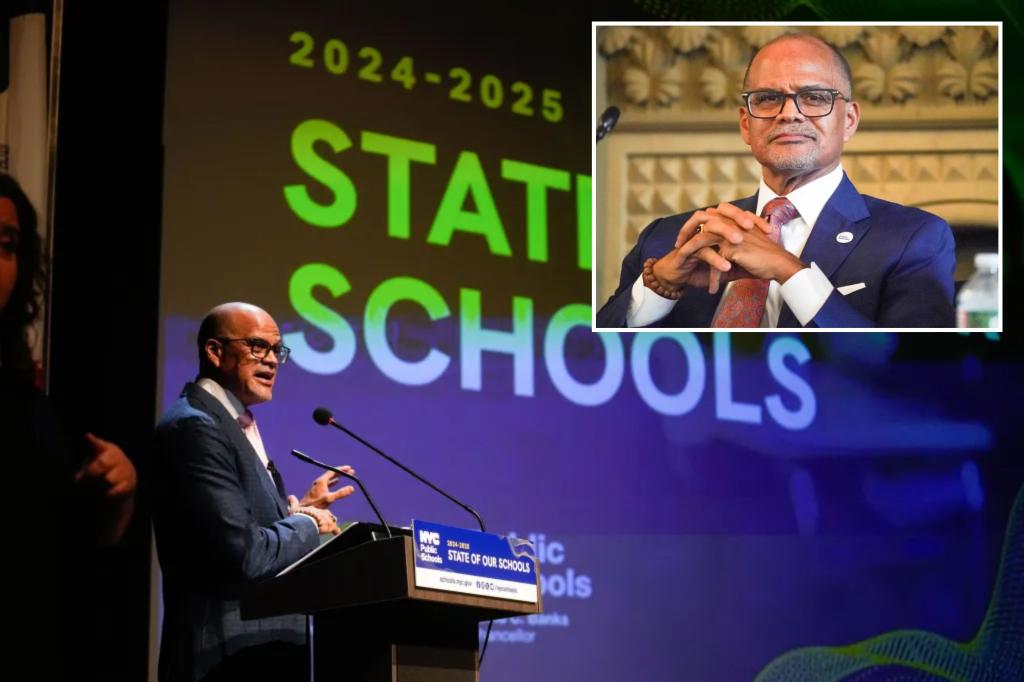Schools Chancellor David Banks did not obtain a waiver to meet with vendors who hired his younger brother, Terence, which could potentially pose a conflict of interest. Public servants are prohibited from taking any actions that would benefit someone associated with them, according to the city’s Conflicts of Interest Board. Despite this, Chancellor Banks met with Marlon Lindsay, the CEO of a tech-ed company that received $1.4 million in taxpayer funds from city schools. Terence Banks’ consulting firm, Pearl Alliance, had 21stCentEd, a tech-ed company, listed as one of its clients.
Marlon Lindsay, the CEO of 21stCentEd, had a private meeting with the schools chancellor in October 2022, shortly after Terence Banks was hired. Following the meeting, the company was hired for programs to help schools teach artificial intelligence, robotics, and automation. Despite questions about his dealings with his brother’s consulting business, the chancellor has declined to provide any answers. The Conflicts of Interest Board rarely grants waivers for public servants to take actions benefiting individuals or firms associated with them, according to the executive director, Carolyn Miller.
The situation involving Chancellor Banks and his brother’s connection to a vendor comes amidst multiple corruption investigations into Mayor Eric Adams’ administration, involving leaders of the NYPD and Department of Education. Recently, the FBI raided Chancellor Banks’ home in Harlem that he shares with his fiancee, First Deputy Mayor Sheena Wright, and seized their cell phones, as well as the phones of Terence Banks and another brother, Philip Banks, who serves as Adams’ deputy mayor for public safety.
A Department of Education spokesman did not provide an explanation as to why Chancellor Banks did not have a COIB waiver to meet with Marlon Lindsay, however, the spokesman did try to distance the chancellor from the vendor’s lucrative contracts. He explained that all spending on companies owned by Marlon Lindsay has come from district offices or schools in amounts under $25,000, which is below the threshold that would require going through the contract process. The dealings between Chancellor Banks and the vendor raise concerns about potential conflicts of interest and the transparency of decision-making within the Department of Education.
The lack of transparency and potential conflicts of interest surrounding Chancellor Banks’ interactions with vendors connected to his brother’s consulting firm raise questions about ethical standards and accountability within the Department of Education. The involvement of multiple members of Chancellor Banks’ family, including his brothers, in contracts with city schools adds further complexity to the situation. The ongoing corruption investigations in Mayor Adams’ administration, along with the FBI raid of Chancellor Banks’ home, contribute to a broader climate of scrutiny and suspicion surrounding city officials and their connections to vendors and contractors.
Moving forward, it will be crucial for the Department of Education and city officials to address the concerns raised by these revelations and ensure that proper safeguards are in place to prevent conflicts of interest and maintain accountability. Transparency and ethical standards must be prioritized in all interactions between public officials and vendors to uphold the public trust and ensure that decisions are made in the best interests of the community. The outcome of the investigations into Chancellor Banks and his associates will have significant implications for the integrity of the Department of Education and the overall transparency of city government operations.













